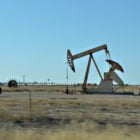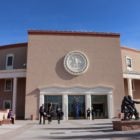2022 Election
Big donors giving most of the cash for governor’s race
|
New Mexico lawmakers in 2019 doubled campaign contribution limits for those seeking seats in the Legislature or running for governor, arguing they needed more money to compete against a deluge of outside spending.
Now, in the first gubernatorial election since 2019, those higher limits appear to have paid off for incumbent governor Michelle Lujan Grisham, a Democrat, and her Republican challenger, Mark Ronchetti.
They’ve both already raised more than candidates raised in 2014 and 2018 during the same time period under the previous, lower contribution limits. Lujan Grisham raised by the first week of September as much as she did for the entire 2018 election.
But there’s another difference too, one that if it was foreseen wasn’t mentioned when lawmakers in years past debated increasing the limits: the majority of the cash used by Lujan Grisham and Ronchetti to run for office this year comes, so far, from a small set of well-heeled groups of individuals and businesses, unlike the previous two gubernatorial elections.
Campaign finance reports reveal multiple instances of tens of thousands of dollars coming from groups of people related through business or family connections, such as spouses, children, and parents.
The higher limits mean such groups can collectively give a much greater amount than before, and in turn garner the greater access and influence that potentially follows.
It’s unclear if one person acts as a “bundler” of such donations, because New Mexico doesn’t require people to disclose the fundraising they do among friends, family or colleagues to support particular candidates.
But groups of related businesses or families and the amounts they’ve given can be identified by examining information reported by candidates, particularly the physical or mailing addresses of donors.
Sixty percent of around $10 million raised by Lujan Grisham through the first week in September has come from donors at just 357 of the more than 13,000 donor addresses provided in her reports.
And 53% of the almost $6.5 million Ronchetti has raised comes from donors at just 206 of the 9,112 addresses in his reports.
From each address in those small groups, the candidates gathered at least $10,000. In many cases there is one donor at the address giving the maximum of $20,800 (half for the primary, half for the general election), but there are many instances in which the total given by multiple people or businesses sharing an address is double that individual legal limit or much higher. The giving reported so far spans the entire primary election cycle, which began Jan. 1, 2021, plus general election donations through early September.






